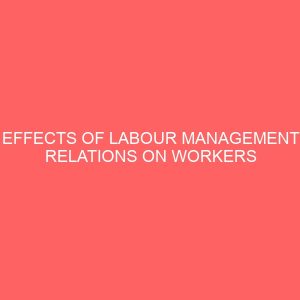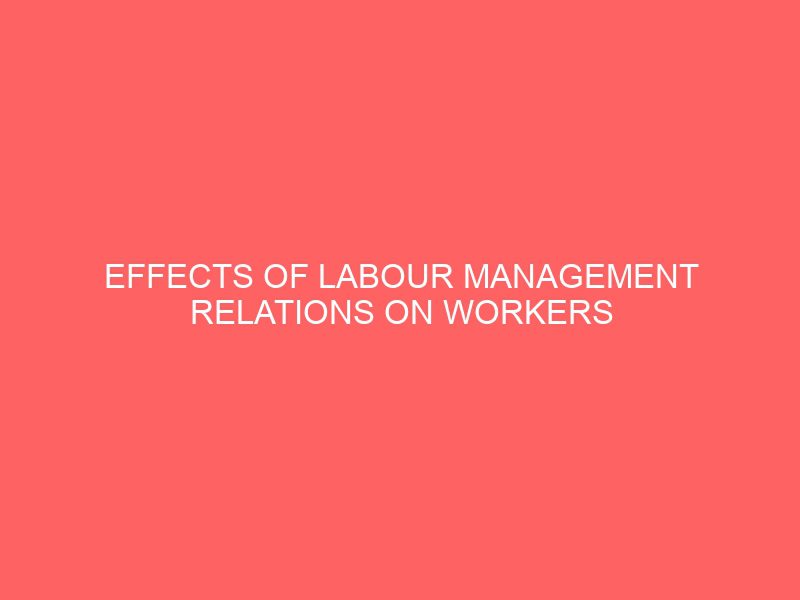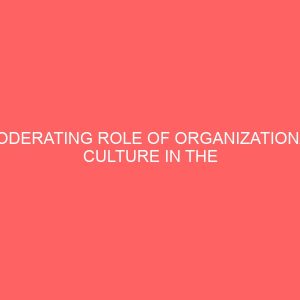Description
CHAPTER ONE
1.0 INTRODUCTION
1.1 BACKGROUND OF THE STUDY
This research is on Effects of labour management relations on workers performance in an organization, a case study of power holding company of Nigeria. In the work place, we have the workers and management team in the organization engage in formal relationship, which is purely for operational purposes. The relationship between the management and workers contractual, which is that the employer-employee relations.
Every organization has some set objectives which it wants to achieve, and these objectives cannot be achieved without an effective cordial relationship between labour and management, these objective: high productivity, large market size and increased asset base. The success of an organization is not only measured by the amount of profit the company can make, but also by the degree of industrial peace and harmony that can be maintained, therefore employers of labour must pay more attention to the needs of labour, so as to maintain high performance. Management having been entrusted with the day running and administration of the organization should regard and treat employees as a vital and essential asset of the organization; employees on the other hand should try to appreciate the effort of management in trying to protect the interest of investors and shareholders.
Labour and Management are faced with many difficult challenges: In an organization, management set goals and targets which it must meet, so they employ men and women from different background to help meat these goals and target. Most often these individuals goals and targets tend to conflict with the organization’s goals and sometimes the goals of the individual worker in the organization conflict with one another, there is therefore bound to be disagreement, disparities, dis-cordination and conflict which vary from minor differences of opinions to intensive discord.
The problem of low performance in an organization occurs when there is no cordial relation between management and its workers; this brings about lack of understanding thereby preventing management and workers from achieving their goals, in such a situation there is usually low productivity, no staff morale, low pay, lack of promotion and no maintenance culture.
The swift-moving of current information, knowledge and skills, continue to increase the difficulty for management to keep up and advance with new development in an organization. It is tragic to note that employers are not aware of the effect of lack of communication to productivity, if information’s are communicated effectively to the employees, it will help them to put their effort in the right direction and prevent waste, information should flow freely from the lowest in the organization to the highest, it is important that workers know at all times what is going on if they are to work happily and confidently.
Workers should be motivated if the best is to be expected from them, money alone does not motivate a worker, job satisfaction and secured tenure of office are equally necessary if not more important (E.I.O. Osundele). The problem of monopolizing decision making by management disrupts peaceful co-existence of labour management relations. Nel (2002) said that industrial democracy is important to workers because it result in an increased share in the control of the organization, management should see workers participation in decision making as a way of increasing the commitment and control of workers. As a result of all these one can easily appreciate the need for a good labour- management relation, if high productivity must be maintained.
1.2 ORGANIZATIONAL BACKGROUND OF POWER HOLDING COMPANY OF NIGERIA (PHCN).
Power Holding Company of Nigeria (PHCN) formally called National Electric Power Authority (NEPA), came into existence by the degree no 24 of 1972 following the amalgamation of the electricity corporation of Nigeria (ECN) and the Niger Dams Authority (NDA). Its name changed form NEPA to PHCN ON May 5th 2005, its consumer population is about 2.5 million and staff strength as at January 2009 was 37,000 comprising of senior staff, management staff and junior staff.
It has the patent right to provide electricity to Nigeria, so producing electricity to its customers is the organizations major objectives with 37 years of its operations major objectives, within 37 years of its operation, it has constructed 10 power stations with only 6 of them operating partially, the power stations are grouped into two, the thermal power stations and the hydrso power stations. The thermal power stations are located at Afam, Delta and Ijora; the hydro power stations are located at Kainji, Shiroro and Jebba. In Enugu zonal headquarters there have 14 field units namely: Onitsha, Ogidi, Awka, Ekwulobia, Abakaliki, Ogui, Abakpa, Aba, Ariari, Orlu, Mbaise, Nnewi, Umuahia and Owerri, the presence of electricity was first felt in Nigeria as far back as 1886.
1.3 ORGANIZATIONAL STRUCTURE OF PHCN
According to the decree setting it up, the affairs of the company are conducted by a 9- man board of directors, with the chairman as the head, all of them been appointed by the minister under the Ogui business unit of PHCN, its organizational structure is represented by the diagram below;








Reviews
There are no reviews yet.